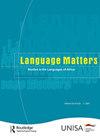尼日利亚哈科特港市场买卖双方议价交易的关系工作策略
IF 0.8
3区 文学
0 LANGUAGE & LINGUISTICS
引用次数: 0
摘要
摘要本研究考察了为维护社会和谐、合作和社会均衡而部署的关系工作策略,以及这些策略是如何(错误地)处理的,从而导致买卖双方在尼日利亚哈科特港五个有目的选择的开放市场中讨价还价的崩溃。使用Android 7.0手机记录了涉及两个或更多卖家/买家的56次交易(每个市场5到20次)。从洛彻和沃茨的关系工作理论角度分析了这种交流。数据显示,卖方/买方使用礼貌、不礼貌和非礼貌策略来实现愉快和有利的谈判结果。其中一些策略显然包含了颜面威胁,另一些则是为了公然损害颜面,还有一些是为了保全颜面。该研究表明,如果不考虑语境,任何话语都不会天生“礼貌”或“不礼貌”。关键词:买卖双方议价交易;政治表达;哈科特港市场本文章由计算机程序翻译,如有差异,请以英文原文为准。
Relational Work Strategies in Seller–Buyer Haggling Exchanges in Markets of Port Harcourt, Nigeria
AbstractThis study examines the relational work strategies that are deployed for the maintenance of social harmony, cooperation, and social equilibrium and how these are (mis)handled such that they result in breakdown in haggling exchanges between buyers and sellers in five purposively selected open markets selected from Port Harcourt city, Nigeria. Fifty-six exchanges (between five and twenty taken from each of the markets) involving two or more sellers/buyers in an encounter were recorded using an Android 7.0 phone. The exchanges were analysed with Locher and Watts’s theoretical perspective on relational work. The data showed that polite, impolite, and non-polite strategies were used by the sellers/buyers to achieve conviviality and favourable negotiation outcomes. Some of the strategies clearly contained face-threats, others were aimed at blatant face damage, and some were deployed for face-saving. The study established that no utterance is inherently “polite” or “impolite” without consideration of its context.Keywords: buyer–sellerhaggling exchangespolitic expressionPort Harcourt marketspragmatic behaviourrelational work
求助全文
通过发布文献求助,成功后即可免费获取论文全文。
去求助
来源期刊

Language Matters
Multiple-
CiteScore
1.20
自引率
0.00%
发文量
19
期刊介绍:
The purpose of Language Matters is to provide a journal of international standing with a unique African flavour focusing on multilingualism in Africa. Although the journal contributes to the language debate on all African languages, sub-Saharan Africa and issues related to multilingualism in the southern African context are the journal’s specific domains. The journal seeks to promote the dissemination of ideas, points of view, teaching strategies and research on different aspects of African languages, providing a forum for discussion on the whole spectrum of language usage and debate in Africa. The journal endorses a multidisciplinary approach to the study of language and welcomes contributions not only from sociolinguists, psycholinguists and the like, but also from educationalists, language practitioners, computer analysts, engineers or scholars with a genuine interest in and contribution to the study of language. All contributions are critically reviewed by at least two referees. Although the general focus remains on multilingualism and related issues, one of the three issues of Language Matters published each year is a special thematic edition on Language Politics in Africa. These special issues embrace a wide spectrum of language matters of current relevance in Southern Africa.
 求助内容:
求助内容: 应助结果提醒方式:
应助结果提醒方式:


